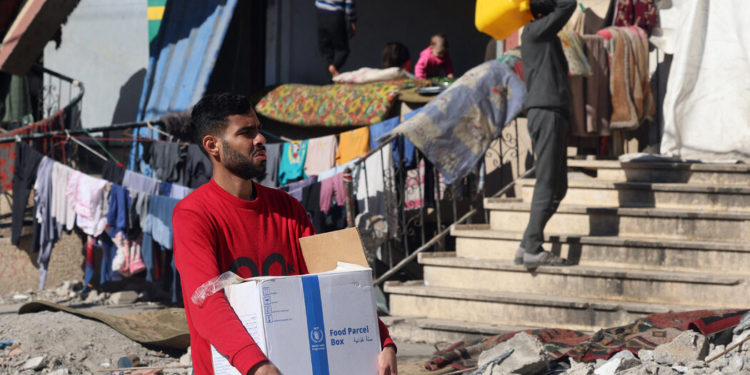By THE NEW YORK TIMES
Israeli leaders have framed an invasion of the southern Gaza city of Rafah as an imperative to achieve its goal of eliminating Hamas. But it’s a strategy that is fraught with complexity and is generating criticism over the potentially catastrophic impact such an operation would have on the more than 1 million Gazans sheltering there.
The planning will likely take Israel’s military some time, Israeli officials and analysts said on Sunday. A major challenge for Israeli forces will be how to move civilians who have crowded into the city out of harm’s way. Many Gazans fled to Rafah on the instructions of the Israeli military to avoid the fighting farther north in Gaza, and a chorus of international leaders have expressed concerns that the people there have nowhere to go.
The prospect of an assault on Rafah is creating tensions with Egypt, which fears a destabilizing influx of Palestinian refugees across its border. Egypt is an important strategic partner for Israel in the region and has played a key role in negotiations aimed at securing the release of Israeli hostages held by Hamas.
The Biden administration has also raised concern over an assault coinciding with the Muslim holy fasting month of Ramadan, according to a report in Israeli media. An attack during Ramadan — which is expected to start March 10, though the timing depends on the sighting of the moon over Mecca — could be viewed as particularly provocativeto Muslims in the region and beyond.
Israeli officials say the military is still working on its plans for invading Rafah and that they have not yet been presented to Prime Minister Benjamin Netanyahu. In the meantime, some have struck a defiant tone about the anticipated assault on a city that officials have called the last Hamas stronghold in Gaza.
“The operation in Rafah will happen,” Avi Dichter, a minister from Mr. Netanyahu’s conservative Likud party, told Israel’s public broadcaster, Kan, on Sunday. “It will begin and it will end, just like in other places,” he said.
He also dismissed the idea that Ramadan should pose any constraints. “Ramadan is not a month without wars — it never was,” he said, noting that Egypt went to war against Israel in 1973 during Ramadan.
Israeli officials and analysts say Israel is acutely aware of the difficulties of mounting an intensive campaign in Rafah.
“Israel understands that Rafah is a complex issue,” said Yaakov Amidror, a former general and national security adviser. “It is not imminent,” he said of the operation, “but it will have to be done.”
Mr. Amidror, now a fellow at the Jerusalem Institute for Strategic Studies, a conservative think tank, said that for Israel to fulfill its war goals of dismantling Hamas’s military capabilities and its ability to govern, the military “must go into Rafah” to destroy the remaining Hamas battalions there.
But given the population density right now, the Israeli authorities understand that doing so without evacuating civilians would be “almost impossible,” he said.
That means civilians in Rafah will need to be moved — and Mr. Netanyahu said in an interview with ABC News that Israel was “working out a detailed plan” to do so.
He did not provide details on where and how that might take place. Mr. Dichter suggested that Gazans could be moved to an area to the west of Rafah along the seashore. Mr. Amidror suggested other options, including some areas of central Gaza where the military has not yet operated, or the nearby city of Khan Younis, once Israel winds down its campaign there.
Gabby Sobelman contributed reporting.







Discussion about this post